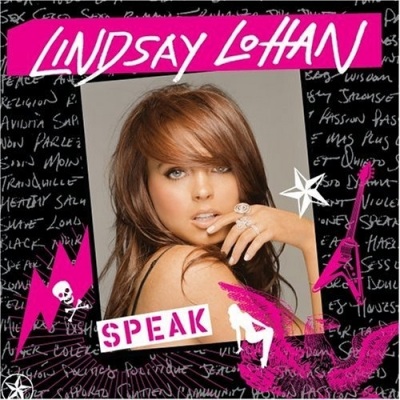
Speak
Lindsay Lohan played a rock & roller in the 2003 remake of the classic Disney identity-change flick Freaky Friday, so perhaps it wasn't a huge stretch for her to leap from acting to singing for the teen idol, yet her 2004 debut, Speak, still feels more like a byproduct of an overdriven, overamplified celebrity culture than an actual album. After all, with just two hit films under her belt, Lindsay wasn't exactly a huge star — particularly one with a proven track record, one who could regularly open movies or had a fan base ready to follow her to pop music. Nevertheless, it was impossible to read gossip columns, entertainment press, and blogs without reading about Ms. Lohan, whether it was details of her feud with Hilary Duff, debates over the authenticity of her breasts, praise for her role in Tina Fey's Mean Girls, reports of her breakup from That 70s Show actor Wilmer Valderrama, and tales of her partying. This relentless flow of stories made Lindsay Lohan a star even to people who never saw her films, the way that the constant coverage of Paris Hilton turned the heiress into a star. And like that creation of celeb culture, Lohan decided it was time to turn herself into a multimedia, cross-platform star, instead of simply an actress, and so Speak was recorded quickly and rushed into the stores at the end of the year. It should come as no surprise that the record sounds like a record that was created in the moment and for the moment, to be the soundtrack to Lohan's wild year. So, there are songs that allude to her partying ways — most explicitly on the lead single "Rumors," where Lindsay bats her eyes for the camera as she pleads to be left alone (it's inexplicably called a bonus track here, btw) — and the music is a blend of old-fashioned, Britney-styled dance-pop and the anthemic, arena rock sound pioneered by fellow tween stars Hilary Duff and Ashlee Simpson. Lohan may be a better singer than Britney — she's mannered, but her voice is fuller than Mrs. Federline's razor-thin squeak — but her record feels a lot more cynical than the equally calculated and polished efforts by Hilary and Ashlee, and it all boils down to this: Lindsay Lohan comes across as ridiculously oversexed and crass. On the cover, the starlet — who officially turned 18 in July of 2004 — looks like a thirtysomething porn star, and she has the heavy-breathing voice and double entendres to match ("I wanna come first" on "First," the lead song, or "I'm not above being under" on "Disconnected"); add to that, she's posed in nothing more than an unbuttoned dress shirt in the liner notes, while there's another picture of her with the word "sex" scrawled over it, twice. When paired with the loud, relentlessly ProTooled dance-pop and hooky but unmelodic songs on Speak, the whole thing is a slick, ugly nadir of 2000s pop culture — the kind of thing that makes Blue Staters think that, gee, maybe the Red Staters were right when they said the U.S. is going to hell. Thing of it is, Lohan could make a good record — she doesn't have a bad voice and is forceful on record. Speak, however, is not a good record. It's more like an open diary documenting a particularly embarrassing teenager spinning out of control.
